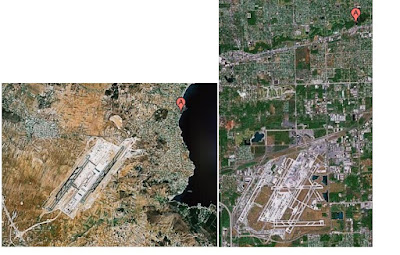First, the meaning of the Sanskrit namaste as I've heard and read:
Nama = bow
as = I
te = you
Literally, "bow me you," or, "I bow to you."
Namaste is often interpretted as: "The divine in me honors the divine in you," "the Light in me recognizes the Light in you," or, "all that is best and highest in me salutes all that is best and highest in you."
* * *
In Greek:
eimaste (είμαστε) = we are
na eimaste (να είμαστε) = may we be
The first syllable of eimaste is often dropped to make na eimaste into a contraction:
na'maste (να'μαστε) = may we be
In Greek, you wouldn't say na'maste by itself. Na'maste needs another word or phrase:
Na'maste kala = May we be well.
Na'maste mazi = May we be together.
Na'maste eutuchizmenoi = May we be happy.
When I began to hear people speak the Sanskrit namaste to one another and to me, I had to work at not hearing the Greek word, usually to little avail. I understood what they meant, but to these Greek ears, namaste sounded incomplete, like half a sentence, a half-hearted wish, a fragment of a thought. My brain tried to translate it to "I bow to you," but my soul kept hearing "may we be."
Then I began to think about being, to meditate on the act/non-act of being, the state of being, chewing on and tasting the experience of I am / we are.
The sound of namaste soon took on a new meaning to me, a meaning that isn't incomplete at all, a meaning that isn't so different from "I bow to you" or "the light in me honors the light in you:" May we be.
To these ears, "may we be" no longer sounds like a fragment of a thought. It is not an empty wish or a fleeting hope for the future but is instead a statement that ushers in an experience or state of being that already is unfolding, an experience or state that already is.
I am. We are. Like a brilliant diamond, one and many-sided...
Na'maste.
 When I slipped my ballot into the machine this morning, I turned to face the voters waiting in line, smiled, and raised my hands in the air, victory-style. Some smiled. Some did not. I thanked the two election officials who stood near the ballot box/machine. They smiled, indeed. Brightly. And I walked out with a bounce in my step. By God, I do love living in this country. What I would love more than anything right now, today, is to find others who feel as happy, grateful, and enthusiastic as do I for having had the opportunity to vote. That's where I am today, right now. I am happy. I feel like celebrating.
When I slipped my ballot into the machine this morning, I turned to face the voters waiting in line, smiled, and raised my hands in the air, victory-style. Some smiled. Some did not. I thanked the two election officials who stood near the ballot box/machine. They smiled, indeed. Brightly. And I walked out with a bounce in my step. By God, I do love living in this country. What I would love more than anything right now, today, is to find others who feel as happy, grateful, and enthusiastic as do I for having had the opportunity to vote. That's where I am today, right now. I am happy. I feel like celebrating.

































